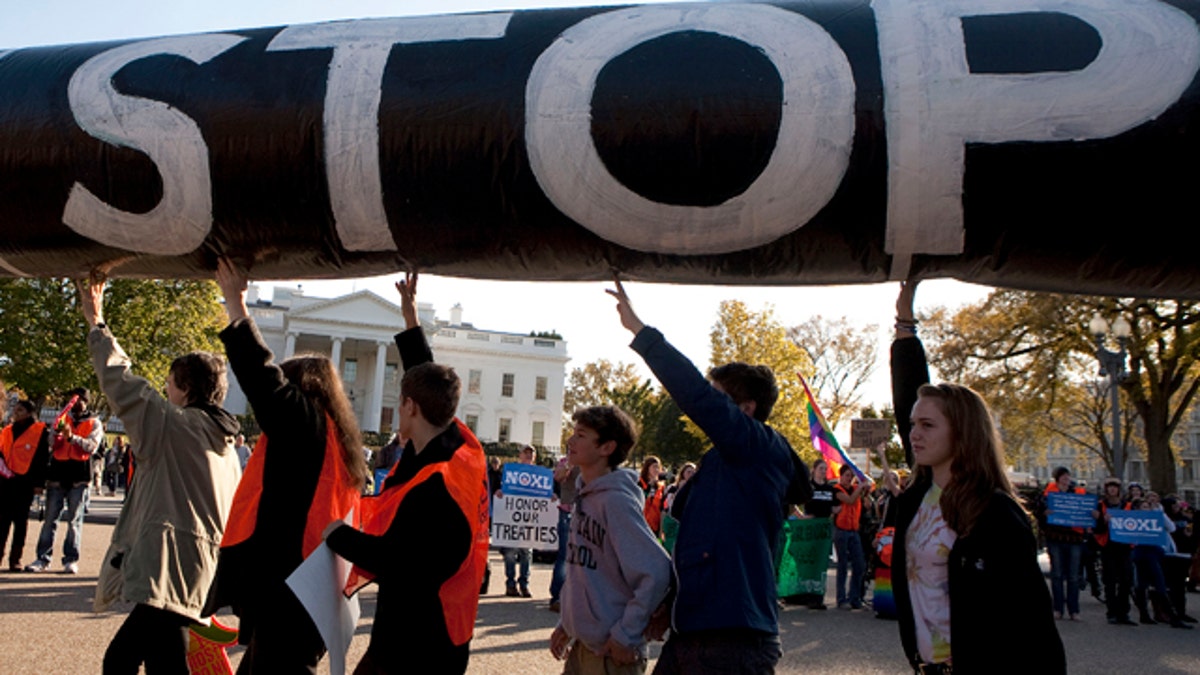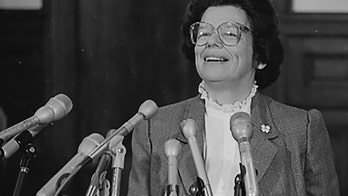
FILE: Nov. 6, 2011: Demonstrators call for the cancellation of the Keystone XL pipeline a rally in front of the White House, in Washington, D.C. (Reuters)
The Senate on Thursday blocked a move to speed along the approval and construction of the controversial Keystone pipeline, after the White House lobbied Democrats to oppose it.
A total of 11 Democrats, though, ended up breaking with the president to vote for the Republican-backed amendment -- at a time when gas prices are rising and pipeline supporters are using that trend to pressure the administration to act.
Senate Republican Leader Mitch McConnell said after the vote that the Democrat-controlled Senate had "turned its back on job creation and energy independence in a single vote."
McConnell, referring to reports later confirmed by the White House that Obama personally lobbied Democrats to oppose the measure, also used the vote to place blame for the pipeline's delay squarely on the president.
"President Obama's personal pleas to wavering senators may have tipped the balance against this legislation. When it comes to delays over Keystone, anyone looking for a culprit should now look no further than the Oval Office," he said.
The amendment, to a massive transportation bill, actually garnered a majority of senators, with 56 voting in favor it. However, the amendment needed to reach a 60-vote threshold.
The proposal would have taken Obama out of the Keystone decision-making process. The move comes after the administration rejected a cross-border permit for the Canada-to-Texas pipeline -- citing environmental concerns as well as the attempt by Republicans to force an early decision.
Construction is moving ahead on the southern portion of that pipeline from Oklahoma to Texas, but the company, TransCanada, must reapply for the northern section that crosses the U.S. border.
Republicans in Congress and on the presidential campaign trail have used the Keystone pipeline issue as a rallying cry -- and proof for their argument that Obama's energy policy is hostile to oil and gas exploration and the economic benefits that come with it.
"It just seems that we are turning our back on (energy) independence from the rest of the world, which would clearly help our consumers as it relates to their pocketbooks," Rep. Fred Upton, R-Mich., chairman of the House Energy and Commerce Committee, said at a hearing Thursday where Energy Secretary Steven Chu testified.
Chu, during the hearing, said he was not involved in efforts to sway senators to oppose the Keystone vote.
After taking heat for earlier comments that some said suggested the department was not looking to lower gas prices, Chu said Thursday that the administration "wants very much to do what we can to lower the price of gasoline."
While Obama lost nearly a dozen Democratic senators on the Keystone vote Thursday, he won enough support to prevent the measure from passing.
Sen. Mark Warner, D-Va., was among those who announced his opposition to the amendment ahead of the voting. He said he supports the Keystone project, but that environmental considerations need to be taken into account.
White House Press Secretary Jay Carney, ahead of the vote, accused Republicans of playing politics with the Keystone issue and disputed any suggestion that speeding the process would somehow lower gas prices.
On the Energy and Commerce Committee, Rep. Henry Waxman, D-Calif., echoed those comments.
"Even if we produced more oil in the United States that's not going to lower the price of gasoline here," Waxman said, since oil is priced on the world market. He said Republicans are "playing politics with this issue."
Democrats who voted for the Keystone amendment on Thursday were: Sens. Max Baucus, D-Mont.; Mark Begich, D-Alaska; Kay Hagan, D-N.C.; Mary Landrieu, D-La.; Joe Manchin, D-W.Va.; Claire McCaskill, D-Mo.; Mark Pryor, D-Ark.; Jon Tester, D-Mont.; Jim Webb, D-Va.; Bob Casey, D-Pa.; and Kent Conrad, D-N.D.




